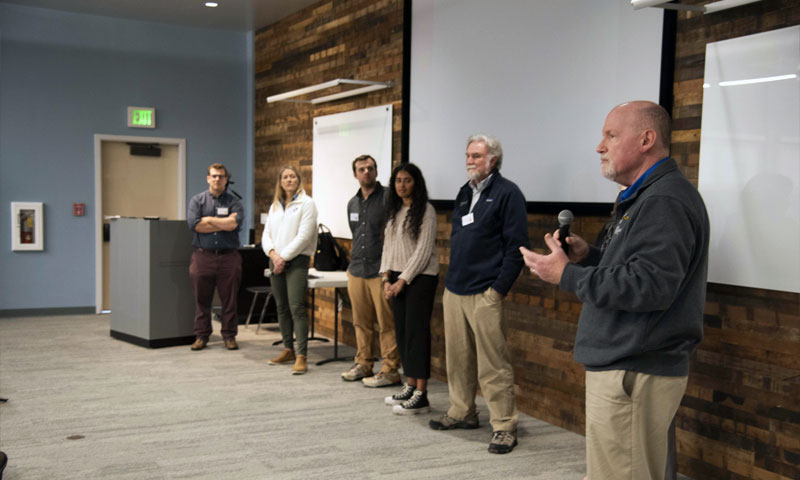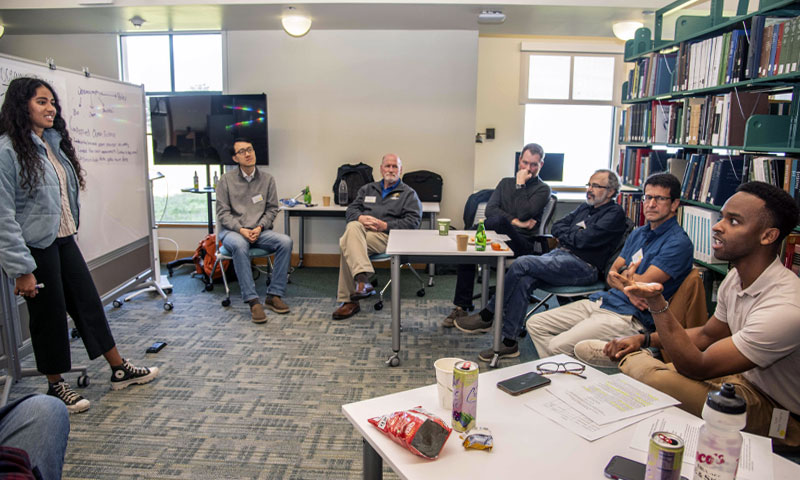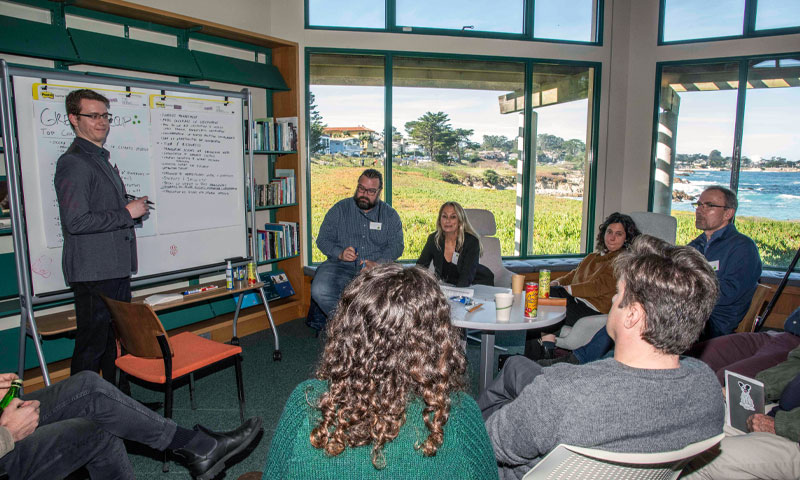As white-capped waves from an ocean undergoing rapid degradation broke ashore along the picturesque coast of Stanford University’s Hopkins Marine Station, a sense of urgency filled students, faculty and staff from the Naval Postgraduate School (NPS) and the Stanford Doerr School of Sustainability gathered at the inaugural Oceans Workshop, Feb. 9.
The workshop is the latest collaboration under an Education Partnership Agreement (EPA) established in 2022 between the two institutions in direct support of the U.S. Navy’s Climate Action 2030 strategy, launched by Secretary of the Navy Carlos Del Toro the same year.
“We are at an absolutely pivotal moment in history,” said Fiorenza Micheli, co-director of the Stanford Center for Ocean Solutions and chair of the Doerr School’s Oceans Department. “The challenges that we’re facing – that humanity is facing – are enormous. And so is the potential for innovation for solutions. And that potential can only be realized through deep, thoughtful, and strategic partnerships.”
NPS’ Oceanography Department and the Doerr School’s Oceans Department co-organized the daylong workshop. It focused on creating a shared vision for a healthy and sustainable ocean and allowing attendees from Stanford and NPS to meet in person, learn about the latest oceanographic research occurring at each institution, and foster deeper collaborative ideas for future research to these complex issues with far-reaching impacts to the global environment, economy and national security.
Researchers presented 35 lightning talks – lasting four minutes apiece – that showcased the diverse range of research activities at both institutions. The talks were grouped into separate sessions covering the areas of near-shore circulation, coastal and physical oceanography, ocean circulation and mixing, marine biodiversity, acoustics, ocean modeling, and observation methods and systems.
In the past, NPS and Stanford pursued this type of interdisciplinary ocean research independently. But in 2022, the Stanford Doerr School of Sustainability was founded, and the Oceans Department was the first department launched by the new school. Later that year, NPS became the first to enter into an EPA with the Doerr School, paving the way for enhanced collaboration and knowledge-sharing. And at the forefront of this agreement, ever since its inception, the Climate and Security Network at NPS has helped spearhead its execution.
“We had the Secretary of the Navy at NPS for the signing with Doerr’s Dean Arun Majumdar and NPS’ President Ann Rondeau. And we’re very proud of that partnership,” said Kevin Smith, Vice Provost for Research and Innovation at the Naval Postgraduate School.
After the agreement was signed, leaders from both institutions determined the core areas of collaboration. “Those were identified as energy security, climate security and sustainability, and ocean sciences,” added Smith.

Throughout the talks between NPS and the Doerr School, climate change issues repeatedly rose to the surface far more frequently than any of the other challenges. For example, Climate Action 2030, launched by Del Toro in 2022, aims to address climate change’s impact on national security.
“Climate affects every aspect of our planet, from the biodiversity of the oceans and lands all the way to societies, cities, and people at all different levels,” Micheli said of the global crisis. “It’s crucial to come at it with different missions and different entry points.”
One viewpoint from the workshop that most surprised Stanford graduate student Raksha Doddabele, who studies population genetics of great white sharks, was the idea that climate change is a national security risk.
“I really liked that framing. The way we change our language can be very powerful,” said Doddabele. “If you frame it as a threat to the American people, then who’s not going to be down with that?”
Drawing on her interest in computational methods and big data, Doddabele was also inspired by the applied nature of NPS’ research, adding, “It would be great to collaborate with people with more engineering and mathematical experience and expertise.”

The workshop inspired the future plans of NPS-Stanford Climate Security Fellow and U.S. Navy Ensign Nicholas Hilaire, who aims to become a submariner after completing his graduate work in Operations Research at NPS. But when he was an undergraduate majoring in ocean engineering at the U.S. Naval Academy, a different kind of potential underwater experience proved instrumental to Hilaire.
“I saw sea level rise and its impacts, especially at Annapolis because it was right on the water. You could often see the flooding,” said Hilaire, who also recalled reading an article published in the U.S. Naval Institute’s “Proceedings,” reporting that much of the Naval Academy would be flooded by 2100.
“What do you mean, sea level rise might force the Navy to abandon the Academy in the future?” he added. “I wanted to know why and how. This was the catalyst for the rest of my journey.”
The Navy knows it’s not just Annapolis that’s threatened. Rising sea level affects fleet installations across the nation and operations around the world. For Hilaire, exposure to the oceans research presented at the workshop provided him with a better perspective of the aquatic world he’ll face from inside a submarine and how changes to the oceans are impacting undersea operations.
Founded in 1892 and located in Pacific Grove, California, on the southern edge of Monterey Bay, Hopkins Marine Station is the oldest marine science institution on the West Coast. And it proved to be the ideal setting for a meeting of the minds to address the oceans.
Mixed within the talks were two breakout sessions that allowed the attendees to interact in small groups and address what they thought were the grand challenges confronting the oceans. The groups then focused on how these challenges might be solved. The workshop concluded with a poster session, which offered attendees a final opportunity to discuss oceans research.
“Seeing the crowd of researchers together today is really what we dreamed about,” said Chuck Litchfield, an NPS graduate who is a Senior Associate Dean and the Chief Operating Officer at the Doerr School. “The fact we’ve had so many people here is a reflection of the interest that has been at the faculty level for some time. And we hope the backing of the Doerr School and the backing of NPS leadership will lead to more fruitful interactions.”


